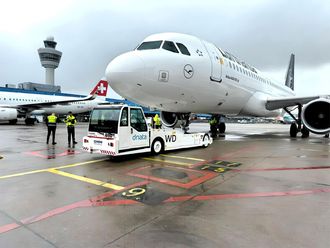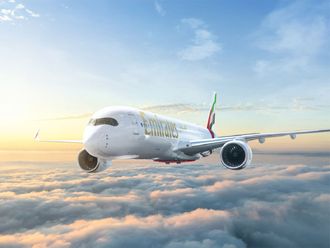Dallas/Chicago: Gulf carriers expanding rapidly in the US are diverting passengers from Delta, American and United instead of attracting new travellers as they have said, according to a study by a group representing the US airlines.
The loss of those customers is a key argument of the US carriers in their claims that Emirates airline, Qatar Airways Ltd and Etihad Airways PJSC are using $42 billion in government subsidies to compete unfairly. All three Gulf carriers have repeatedly denied the accusations.
Chief executives from Delta, American, and United are appearing on Friday in Washington to press their view that their Gulf rivals are using discount connections through their hubs in the Middle East to win international traffic. The US airlines want the Obama administration to block those carriers from adding new flights pending the outcome of talks on modifying Open Skies agreements with Qatar and the UAE.
“The Gulf carriers have failed to meaningfully stimulate new traffic to and from the United States,” according to a study by economic consultant Compass Lexecon being released Friday by the Partnership for Open and Fair Skies. “As a result, the traffic gains enjoyed by the Gulf carriers due to their subsidised expansion to the United States and elsewhere have come at the expense of US and other carriers.”
New service
About 11,000 new daily seats were added between the US and Dubai, Doha and Abu Dhabi from 2008 to 2014, with more than 95 per cent from the Gulf airlines. At the same time, there was essentially no change in the traffic originating or concluding at either end of those routes, the study said.
A single Gulf carrier with as little as a 3 per cent market share on a route between a US city and an international destination reduces the number of passengers for a US airline by 8 per cent, on average, the study said. Where all three Gulf carriers serve the route, US airlines’ passengers fall by 24 per cent, according to Compass Lexecon.
The analysis looked at both traffic between the US and the hubs of Emirates, Qatar, and Etihad and travel between the US and points beyond those cities, such as India.
US carriers that dominate a market will always lose some market share when a new airline begins service, Etihad general counsel James Callaghan said in an interview.
“They are being forced to compete,” Callaghan said. “When you compete, your prices go down and, therefore, you attract more passengers. The overall size of those markets where they do compete with us, they have actually increased their passenger numbers. That’s called competition. That’s the success of Open Skies.”
Etihad said the US carriers received about $64.9 billion in bankruptcy and pension-related aid from the US government, benefits which are generally only available to US carriers and which helped to create a “highly distorted market”. An Etihad commissioned research shows “no evidence whatsoever” of any harm to US counterparts.
The US government is accepting comments on the complaints from American Airlines Group Inc, Delta Air Lines Inc and United Continental Holdings into May. After that, it will decide whether to initiate Open Skies discussions.












